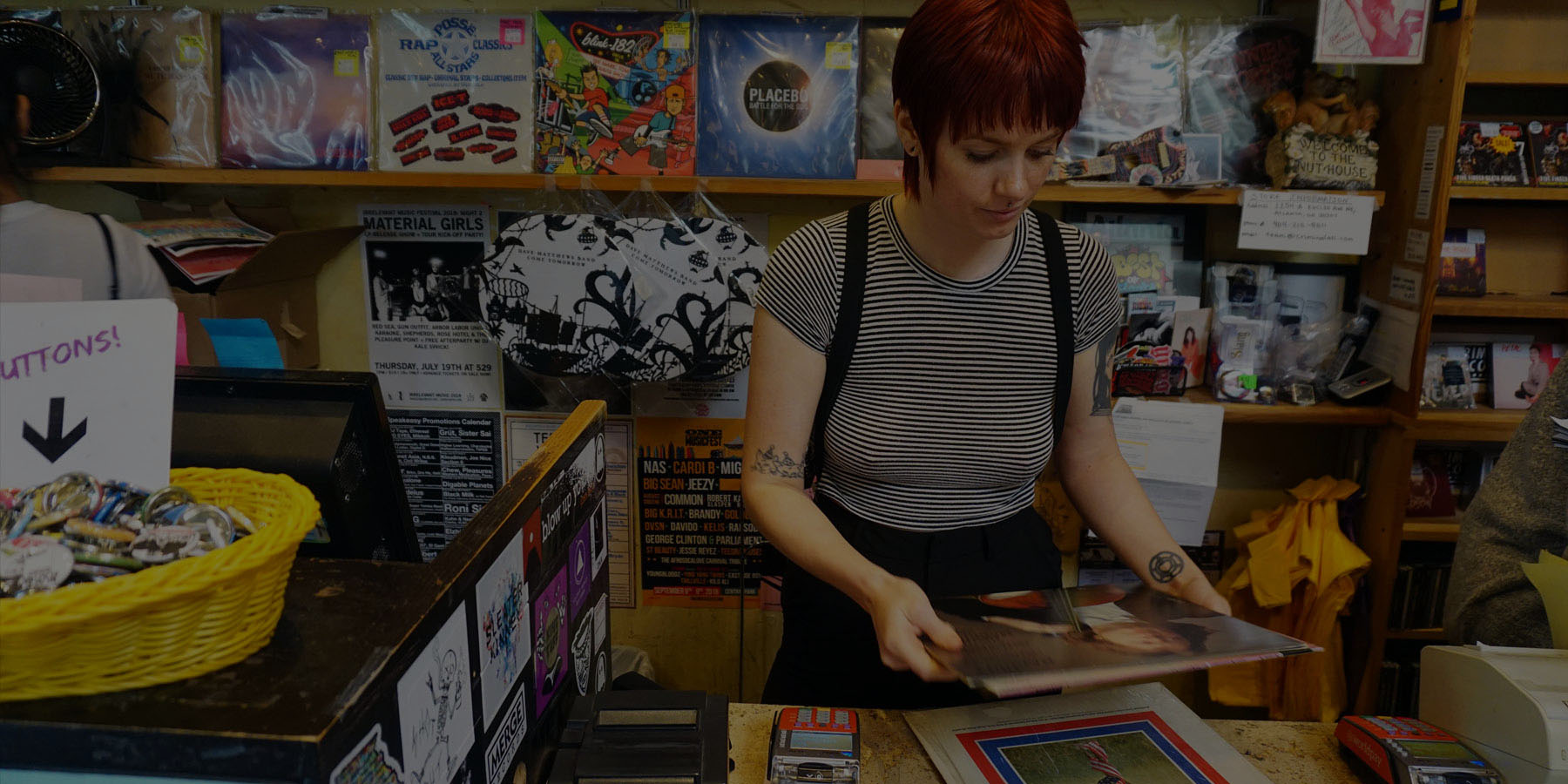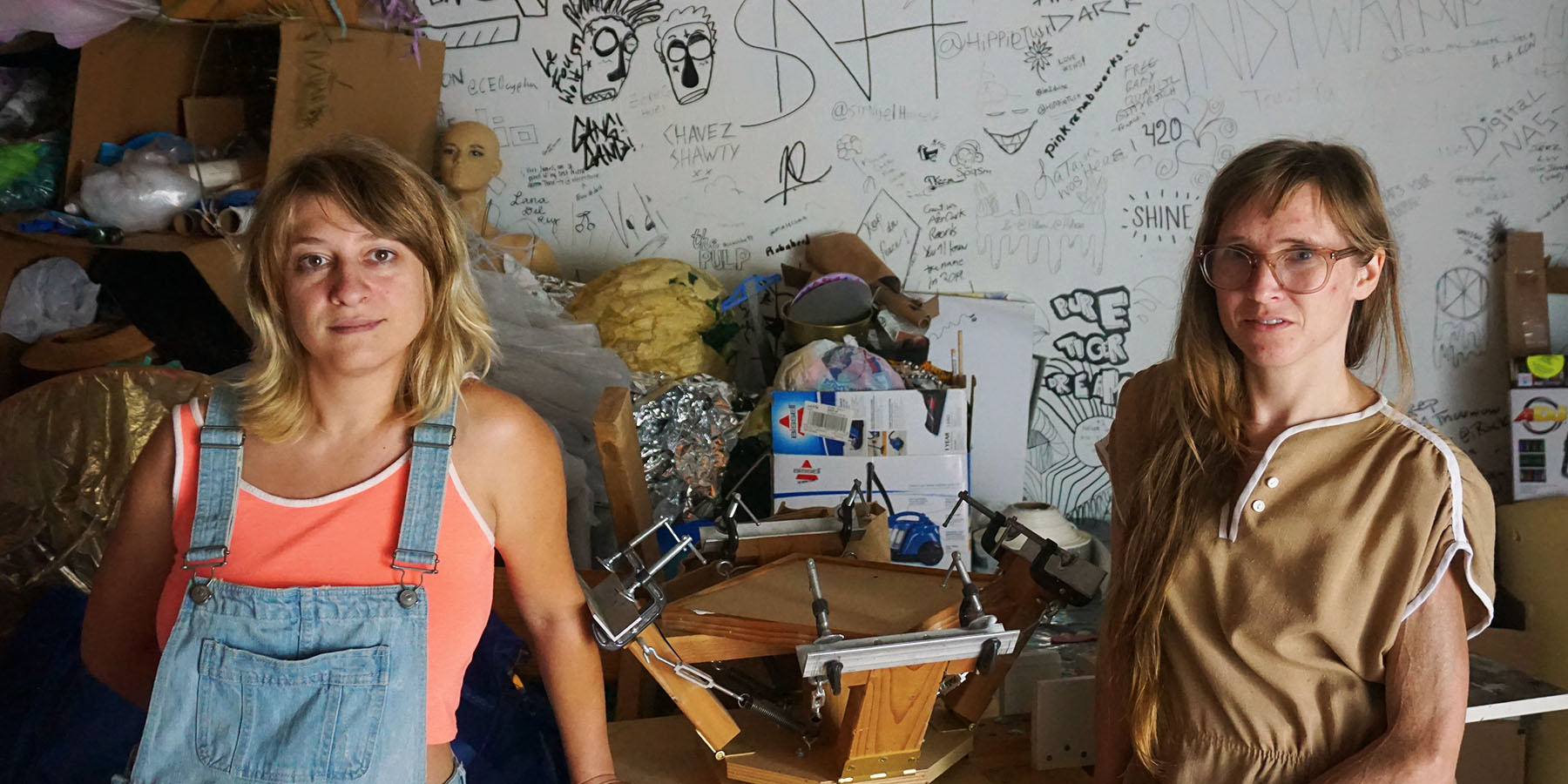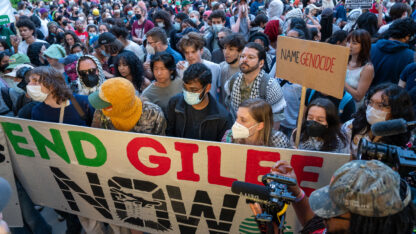Atlanta Is 14th On A List Of Hipster Cities. Here’s A Look At The Influential Subculture

Ilizibith Miller works at Criminal Records, a record store located in Little Five Points.
Lauren Booker
Atlanta is a hotbed for hipsters.
The city was 14th on MoveHub’s Hipster Index, which ranked 446 cities based on the number of vintage boutiques, vegan eateries, coffee shops, tattoo studios and record stores per 100,000 residents. Atlanta was the only Georgia city on the list.
But being a “hipster city” means more than just coffee shops and trendy haircuts. The sometimes-ambiguous subculture has had a sweeping impact that can be felt throughout the region, experts say.
“What’s put us on the map from an international level is the fact that we are creating music. We’re creating fashion. We’re creating film, television media that really impacts the entire world and influences the world,” ChooseATL Director of Marketing and Development Ashley Cleveland said. “And so a lot of that has come from what, I think, is known mainstream as the hipster culture.”
Why Atlanta Attracts Hipsters
Still, hearing the word hipster does bring to mind a certain aesthetic, even if calling a person a hipster can’t necessarily be based on where they go or what they wear.
While Your Dictionary says they’re a “young, non-traditional person who is an independent thinker,” Urban Dictionary claims they’re “people that try too hard to be different … by rejecting anything they deem to be too popular.”
Even though the subculture and its effects can be disputed, one common thread among hipsters is the desire to express individuality.
Cleveland said she thinks hipster and artistic cultures are intertwined, with artists frequenting yoga classes and thrift stores in the city.
“I think that the hipster term is a little antiquated, specifically within the hipster community,” she said. “For folks that once identified as hipsters, I believe that a lot of those folks are now identifying as creatives.”
Atlanta’s quality of life, cost of living and the creative industries can draw hipsters to the area, according to Cleveland.
“Living in a place that they can play, as well as have access to their work but being aware of the environment and how their footprint impacts the world,” she said.
Dawn Porras, owner of Joe’s East Atlanta Coffee Shop, said creatives, ranging from writers to artists, frequently use the neighborhood café as their workspace.
“I can’t tell you the amount of books that have been written in the coffee shop, how many we’ve been given a credit to in someone’s novel, which is great, or someone’s thesis or people that are in there actively working on their art,” Porras said.
Cleveland said hipsters have been “bubbling up” in Atlanta’s walkable neighborhoods, such as Old Fourth Ward, Edgewood, the Auburn District and West Midtown, for years.
“I think it’s about consciousness of community and sustainability and access,” she said.
A Catch-22
Atlantan Sahima Godkhindi said the “hipster look” can be seen in the artist community, who are attracted to Atlanta for the financial opportunities within the area.
“I just think [Atlanta’s] got a growing art community where the art could lead to paying money, paid gigs. So it’s a small enough pond for young artists to find their voice and find opportunities,” Godkhindi said. “So that might be a correlation.”
While hipsters and artists can look similar in style, The Bakery founder Willow Goldstein said they are not the same.
“There’s wearing overalls because you are actually doing manual labor,” Goldstein, creative director of the multi-faceted arts complex in Southwest Atlanta, said. Then, “there’s wearing overalls because you bought them at whatever store in Buckhead, Virginia-Highlands, name a place that are overalls that are for fashion and fashion alone.”

You are in this catch-22 of describing yourself as the thing that you don’t like to separate yourself from it by sounding more pretentious than it is.
-Willow Goldstein, the founder and creative director of The Bakery
Arguing whether hipsters and artists are or aren’t the same is a moot point “because it puts you in this box of being what you are arguing against,” according to Goldstein.
The Ripple Effect
The subculture’s need for uniqueness stems from a ripple effect flowing from a pre-hip person (or a person who is an enthusiast about something) to hip groups to hipsters, according to University of California, Los Angeles sociology lecturer Terri Anderson.
Anderson, who has taught a course at UCLA on the modern hipster called “Hip & Cool: A Study of Distinction & Exclusion,” said the subculture emerged from people wanting to be insiders on what’s hip.
“It makes you special, and people want to be special, but they want to be special in ways that make them attractive,” Anderson said.
For some hipsters, it’s having a limited-edition press. Criminal Records’ Sean Zearfoss said he’s found that hipsters tend to gravitate to the nostalgia of used records.
“It’s like if I can have the first press of this record, I am definitely going to get the first press of this record instead of a brand new press,” he said.

For others, it might be buying a rare, vintage piece.
“It’s dreaming about better times. So it’s fantasy. It’s drama. It’s thinking about life as if it’s a movie. It’s a creative experience,” said Jenn Bress, manager at vintage and modern clothing store The Lucky Exchange.
She estimated that 35 to 40 percent of her customers are hipsters.
An Economic Impact
Anderson said when hipsters pick up on trends, it can lead to the commodification of a certain product or service, like a latte from a local coffee shop.
“The hipster gets stuff sold,” Anderson said.
The subculture can help drive financial growth for local businesses and neighborhoods in Atlanta, according to Cleveland.
“There is economic capital and power in the community, I think, that has been created around the hipster and creative culture. And so understanding that has made it more acceptable,” she said.
Cafe Sunflower Buckhead’s General Manager Annie Sun said most of their customers are not vegan and come in to enjoy the ambiance and to taste popular dishes, such as the Sesame Soy Chicken and the Orzo Eggplant Lasagna.
Sun appreciates the hipsters who come into the restaurant, and they’ve contributed to her long-running, family-owned business’ growth.
“Since veganism has gained so much more popularity, our restaurant has gained more exposure as well,” she said.
However, some fear that with this growth comes more development in areas that could push people, like artists and low-income residents, out. Anderson said that the path from hip to hipster is “the path to gentrification.”
“The rough neighborhood is the one that if artists will pretty it up, it eventually gets gentrified,” she said. “Basically, the path of gentrification is from what I see, especially in the hipster-focused area of study, is that it will start when artists move to a neighborhood. Artists do not typically move to a neighborhood intending to gentrify it, and they are not the people who gentrify it. I think they are the people who draw those who gentrify it.”
Goldstein, who grew up in Cabbagetown, saw the effects of gentrification as a child. She said artists she knows from back then can’t afford to live there anymore.
With her business being near the Atlanta BeltLine, she sees gentrification as a future for the area.
“This being the last affordable segment of Atlanta is going to contribute to that. Like everything, it’s set up prime for it to happen,” Goldstein said. “You reach a point when some people are just interested in a trend, and it changes overnight … and that’s where hipster as a negative term comes in because they have the money and the resources and the flexibility to make that catastrophic redefinition of an area.”
Whether you like hipsters or not, their impact is felt throughout Atlanta, leaving a lasting mark on the city.
“It’s really our scene, our music scene, our food scene, our art scene, our fashion scene and how that really transcends to influence the entire country,” Cleveland said.
Editor’s Note: Willow Goldstein’s title and the location of The Bakery has been updated since the previous version of the story.














